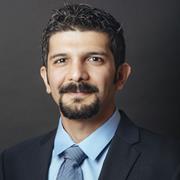Biography
Damoon Soudbakhsh is an assistant professor in the Department of Mechanical Engineering at Temple University. His research interests are in the broad area of optimal modeling and control. He is working on advancing analytical tools and data-driven modeling techniques, with an emphasis on energy systems. He has industry experience in developing resilient and energy-efficient transportation systems. He earned his Ph.D. from The George Washington University, Washington DC, in Transportation Safety. He introduced several advanced human-in-the-loop control techniques for active safety vehicle systems, including a steering-control collision avoidance system and an intelligent speed adaptation system.
He was a member of the Active Adaptive Controls Laboratory at the Massachusetts Institute of Technology (MIT) for four years. As a research scientist at MIT, he introduced algorithms for the co-design of Cyber-Physical Systems with examples in a variety of applications from automotive to wide-area-control of power systems. In addition, he developed adaptive algorithms for fault detection and health monitoring of jet engine components.
Damoon Soudbakhsh is a recipient of the Khwarizmi Young Award and the Dwight Eisenhower Transportation Fellowship Award. He has authored two book chapters in the Handbook of Intelligent Vehicles and Lecture Notes in Control and Information Sciences. He is a member of energy storage and networks systems technical committees. Also, he served as the Programs Chair of the ASME-Boston section from 2015 to 2017.
Research Interests
- Data driven and Physics-informed Machine Learning of Energy Storage Systems
Health monitoring of energy systems
Autonomous and semi-autonomous systems
Cyber-Physical Systems
Linear and nonlinear control
Optimization
Intelligent transportation systems
Courses Taught
|
Number |
Name |
Level |
|---|---|---|
|
ENGR 2332 |
Engineering Dynamics |
Undergraduate |
|
ENGR 3001 |
Engineering Economics |
Undergraduate |
|
MEE 3422 |
Modeling and Control of Electromechanical Systems |
Undergraduate |
|
MEE 4422 |
Mechanical Vibrations |
Undergraduate |
Selected Publications
-
Ahmadzadeh, O., Wang, Y., & Soudbakhsh, D. (2024). A data-driven framework for learning governing equations of Li-ion batteries and co-estimating voltage and state-of-charge. Journal of Energy Storage, 84, pp. 110743-110743. Elsevier BV. doi: 10.1016/j.est.2024.110743
-
Lukyanenko, A. & Soudbakhsh, D. (2023). Probabilistic motion planning for non-Euclidean and multi-vehicle problems. Robotics and Autonomous Systems, 168, pp. 104487-104487. Elsevier BV. doi: 10.1016/j.robot.2023.104487
-
Rodriguez, R., Wang, Y., Ozanne, J., Morrow, J., Sumer, D., Filev, D., & Soudbakhsh, D. (2023). Adaptive Learning and Optimization of High-Speed Sailing Maneuvers for America's Cup. Journal of Dynamic Systems, Measurement, and Control, 145(2). ASME International. doi: 10.1115/1.4056107
-
Derakhshan, M., Sahraei, E., & Soudbakhsh, D. (2022). Detecting mechanical indentation from the time constants of Li-ion batteries. Cell Reports Physical Science, 3(11), pp. 101102-101102. Elsevier BV. doi: 10.1016/j.xcrp.2022.101102
-
Rodriguez, R., Wang, Y., Ozanne, J., Sumer, D., Filev, D., & Soudbakhsh, D. (2022). Adaptive Takeoff Maneuver Optimization of a Sailing Boat for America’s Cup. Journal of Sailing Technology, 7(01), pp. 88-103. The Society of Naval Architects and Marine Engineers. doi: 10.5957/jst/2022.7.4.88
-
Ahmadzadeh, O., Rodriguez, R., & Soudbakhsh, D. (2022). Modeling of Li-ion batteries for real-time analysis and control: A data-driven approach. 2022 American Control Conference (ACC), pp. 392-397. 2022 American Control Conference (ACC): IEEE. doi: 10.23919/acc53348.2022.9867616
-
Derakhshan, M. & Soudbakhsh, D. (2022). Temperature-Dependent Time Constants of Li-ion Batteries. IEEE Control Systems Letters, 6, pp. 2012-2017. Institute of Electrical and Electronics Engineers (IEEE). doi: 10.1109/lcsys.2021.3138036
-
Rodriguez, R., Wang, Y., Ozanne, J., Sumer, D., Filev, D., & Soudbakhsh, D. (2022). Adaptive Learning for Maximum Takeoff Efficiency of High-Speed Sailboats. IFAC-PapersOnLine, 55(12), pp. 402-407. Elsevier BV. doi: 10.1016/j.ifacol.2022.07.345
-
Keshavarzi, M., Derakhshan, M., Gilaki, M., L'Eplattenier, P., Caldichoury, I., Soudbakhsh, D., Sahraei, E., & IEEE (2021). Coupled Electrochemical-Mechanical Modeling of Lithium-Ion Batteries Using Distributed Randle Circuit Model. INTERNATIONAL CONFERENCE on ELECTRICAL, COMPUTER and ENERGY TECHNOLOGIES (ICECET 2021), pp. 2148-2153. doi: 10.1109/ICECET52533.2021.9698796
-
Lukyanenko, A., Camphire, H., Austin, A., Schmidgall, S., Soudbakhsh, D., & IEEE (2021). Optimal Localized Trajectory Planning of Multiple Non-holonomic Vehicles. 5TH IEEE CONFERENCE on CONTROL TECHNOLOGY and APPLICATIONS (IEEE CCTA 2021), pp. 820-825. doi: 10.1109/CCTA48906.2021.9658995
-
Soudbakhsh, D., Gilaki, M., Lynch, W., Zhang, P., Choi, T., & Sahraei, E. (2020). Electrical response of mechanically damaged lithium-ion batteries. Energies, 13(17). doi: 10.3390/en13174284
-
Stacy, A., Gilaki, M., Sahraei, E., & Soudbakhsh, D. (2020). Investigating the Effects of Mechanical Damage on Electrical Response of Li-Ion Pouch Cells. Proceedings of the American Control Conference, 2020-July, pp. 242-247. doi: 10.23919/ACC45564.2020.9147883
